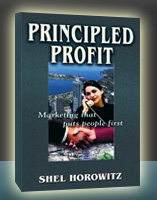Why Ethical Investors are Demanding a Return to the Gold Standard
|
By Ron Robins, Founder & Analyst – Investing for the Soul The rising price of gold stands as the ethical barometer of the mismanagement of our fiscal, monetary, and currency systems. Gold is in the early stages of re-asserting its historic role of helping to bring order to monetary and currency chaos. Its price has risen more than fourfold over the past ten years as a result of investors anticipating the predictable financial and currency chaos we have today—and what is likely yet to come.
The central banks and government treasuries, particularly those of the US, Europe, and Japan, have been weakened and our trust in them eroded. For decades they assured us that only they and their paper currencies and fractional reserve banking systems can keep our economies growing forever. They are now failing for all to see. And before the ships of state sink and economies further submerge they bail out their banking friends. The monetary and currency systems and organisations responsible for them are deteriorating because they essentially lack an ethical standard. That is not to say that most individuals in these organisations are unethical. It is that as organizations they implemented policies over the past several decades that knowingly—or they should have known—would eventually lead to great financial and economic hardship. One such policy was the encouragement of debt creation way beyond income or economic growth. When this policy failed, it led to tens of millions of people losing their jobs globally, millions losing their homes, and retirees in developed countries losing their savings as interest rates were reduced to near zero. It is in this sense that these organizations were, and are, without an ethical standard. To rise to the top among many of these banking and financial organizations, requires not only brilliance, but usually subservience to base instinctual values of status and greed. According to Dr Paul Ray’s research on Americans’ values, close to half the American population’s primary values include those of status and greed. It could be argued that even Timothy Geithner, the US Secretary of the Treasury, exhibited these values. Before his appointment it was divulged that he owed taxes that went back several years. He then hurriedly paid them to smooth his appointment to head the US treasury, the most powerful treasury on earth. About those taxes—he says he just ‘forgot’ to pay them. When many in the financial, banking and political elites are motivated primarily by greed, unethical financial behaviour asserts itself. ‘Moral hazard’ is the term economists give to this condition. Until we as a species are able to have an inner compass that is driven by higher ethics and consciousness, then some form of firm control in regard to credit and debt creation has to be enabled. Gold is ideally suited to act in this controlling capacity. However, anyone who studied economics at Western universities and colleges since World War II, left with the understanding of gold as a ‘barbaric relic.’ This is how John Maynard Keynes, the ‘guru’ of today’s economists, famously referred to gold. It is perceived wisdom today that we are capable of managing our monetary and currency affairs more wisely than having them subjected to the hard discipline of a gold standard, or some system where gold acts to control the issuance of currency or credit availability. What modern economists choose to forget is that during the late nineteenth and early twentieth centuries while the world was on a gold standard, global economic growth was unprecedented. As is now obvious, the perceived wisdom of modern monetary and currency management is shown to be false. Monetary conditions are increasingly calling for the kind of control that only gold can offer. However, it is unlikely that we would go back to a traditional gold standard—where everything is linked to gold. What is more probable is the tying of gold to a new international currency or to some form of monetary or credit measure. It is known that because of the vexing issues with all the four major global currencies—the dollar, euro, yen and pound—that the International Monetary Fund (IMF) is developing proposals for a new international currency. Countries such as Brazil, Russia, India and China (the ‘BRIC’ nations) as well as Western countries like France are demanding the establishment of a new world currency as well. Soon it will be realized that all paper currencies have the same historical deficiencies: their administering agencies and human governors lack the necessary restraints on credit creation unless they are tied in some way to a commodity standard. And that is best fulfilled by gold. Jim Sinclair, one of the world’s greatest experts on gold, believes the US will eventually be forced to anchor the dollar to gold. He says the tie will be the gold held by the US Federal Reserve and Treasury versus a measure of international liquidity (ie money and or credit). Already some central bankers are acknowledging the inadequacies of the present system and beginning to resort to gold. After more than two decades of mostly gold dishoarding, central banks are again becoming net buyers of the metal. They include China, India and Russia. A Bloomberg story reported in June on a UBS survey of central bank reserve managers and other financiers, found that 30 per cent of them cited gold as being the best performing asset they could own for the balance of this year. That was the highest percentage for any asset class. We are in the midst of major currency and monetary upheavals the like of which we have not seen since World War II. Deep, fundamental fissures have been exposed. Most notably: the lack of an ethical compass by institutions managing our monetary and currency systems, the policies of our monetary authorities who see the only way forward as the promotion of excessive debt, and the increasing moral hazard among bankers and financiers. Investors and the global public are viewing these developments with alarm. Gold’s rising price represents an ethical barometer of their views. Gold is in the early stages of re-asserting its historic role as an anchor to our monetary and currency systems. It may well yet save the floundering ships of state. Ron Robins, MBA, is founder and analyst at Investing for the Soul, one of the world’s premier ethical investing sites. He is also financial and economics columnist at alrroya.com, a leading Middle Eastern business portal. His wordpress blog, Enlightened Economics, discusses a new economics that brings consciousness into economics. Article (c) alrroya.com |


 Shel specializes in affordable, ethical, and effective marketing for authors, publishers, small businesses, nonprofits, and community groups. Copywriter, marketing and publishing consultant, international speaker, and award-winning author of seven books.
Shel specializes in affordable, ethical, and effective marketing for authors, publishers, small businesses, nonprofits, and community groups. Copywriter, marketing and publishing consultant, international speaker, and award-winning author of seven books.